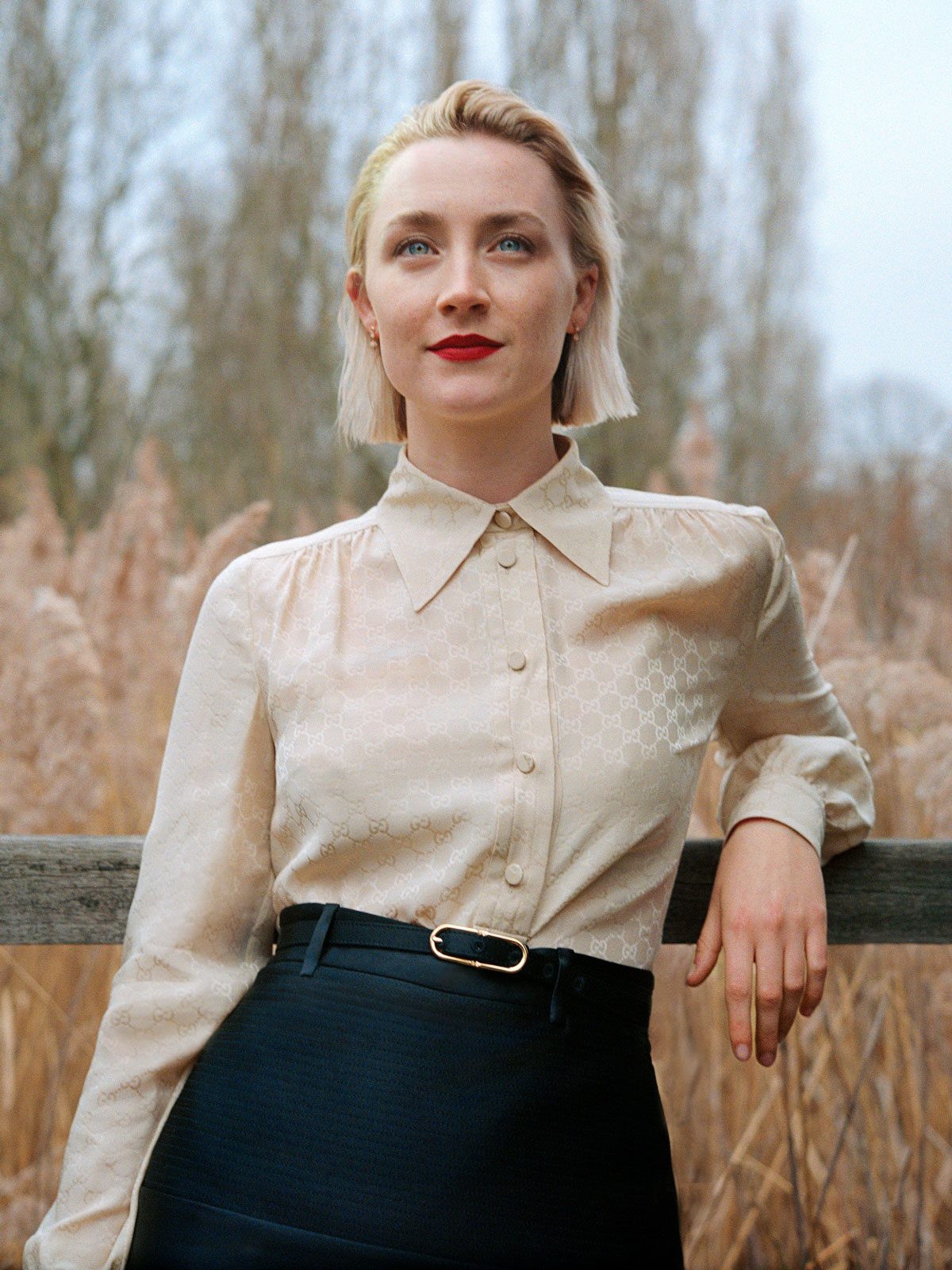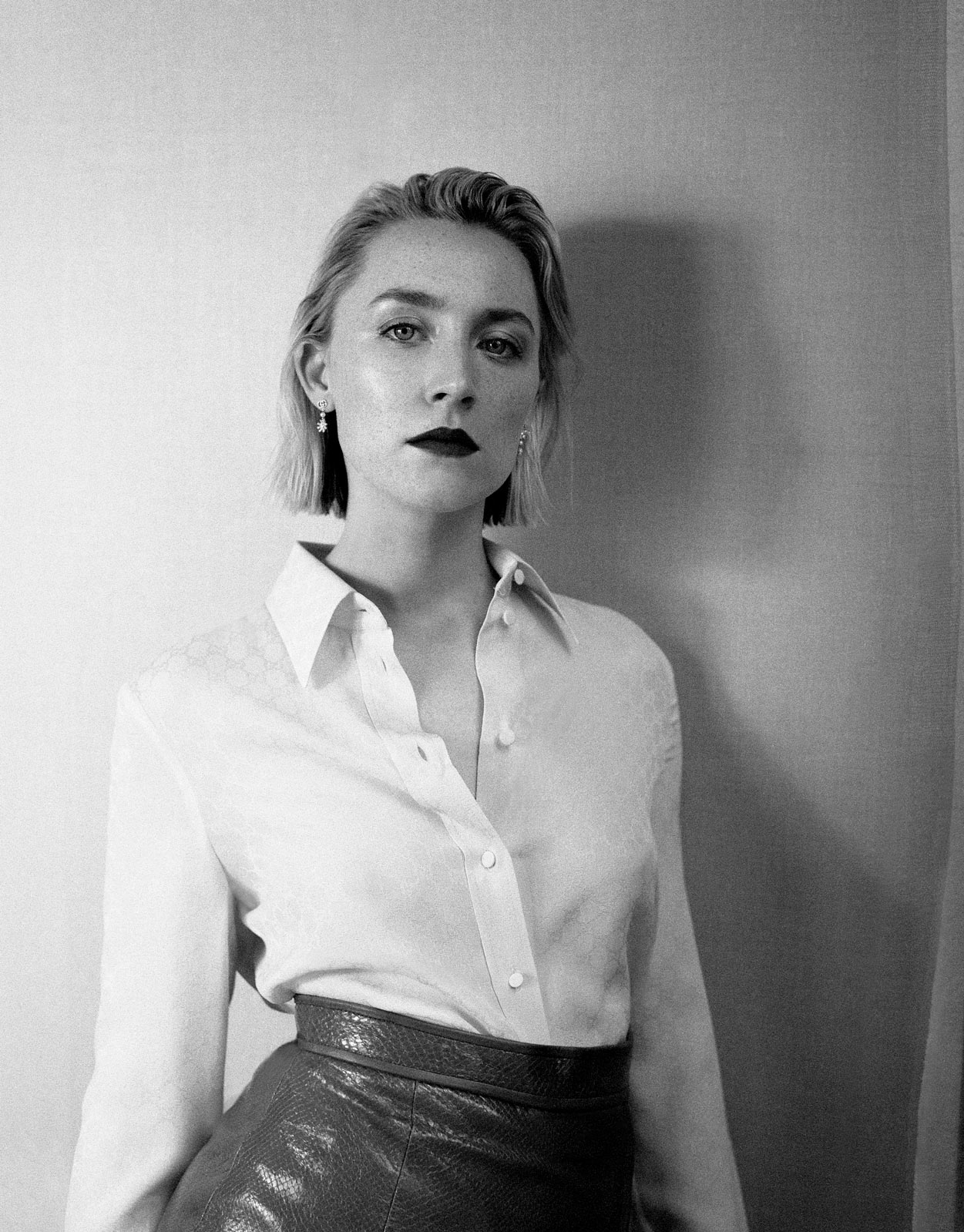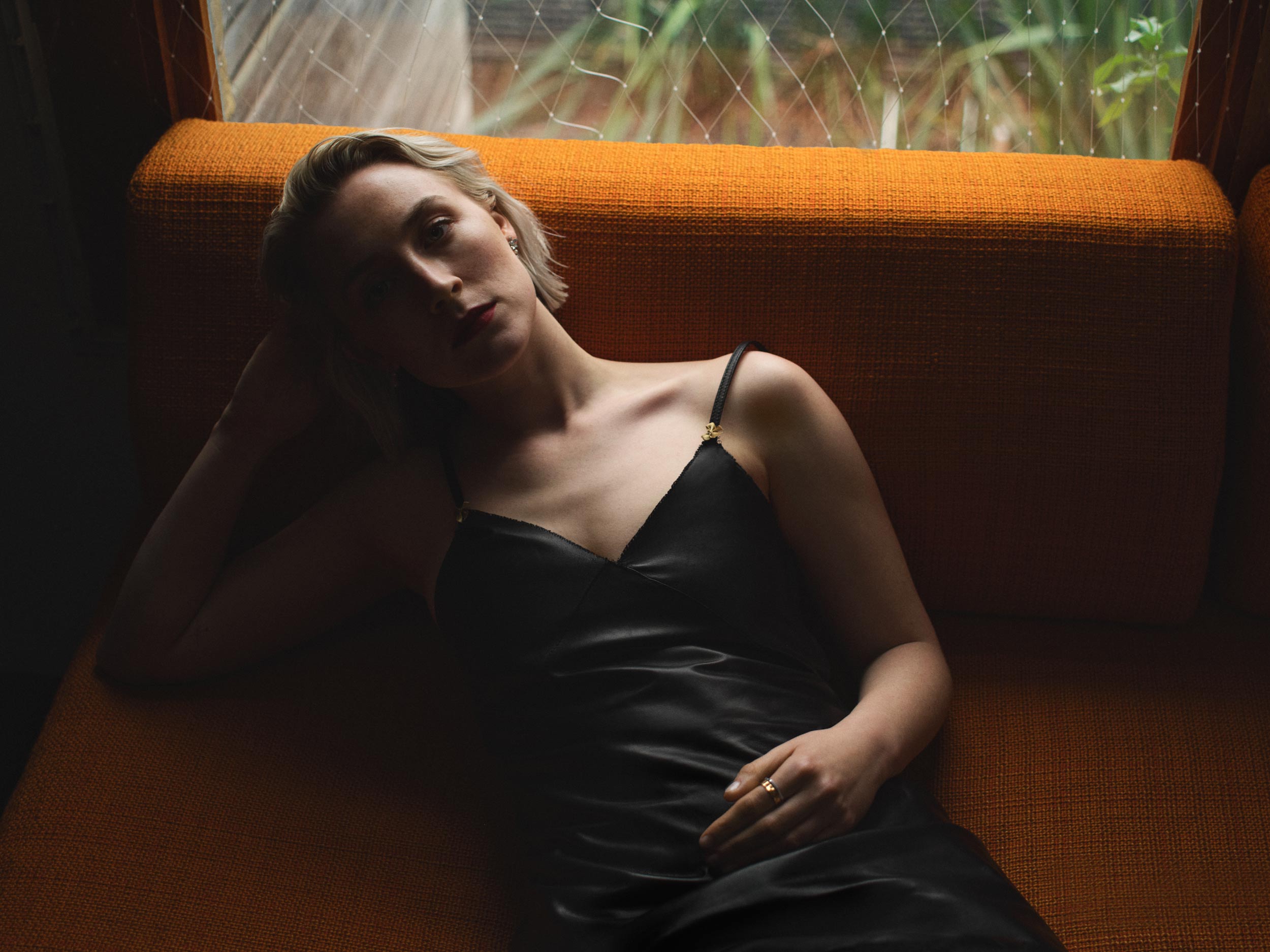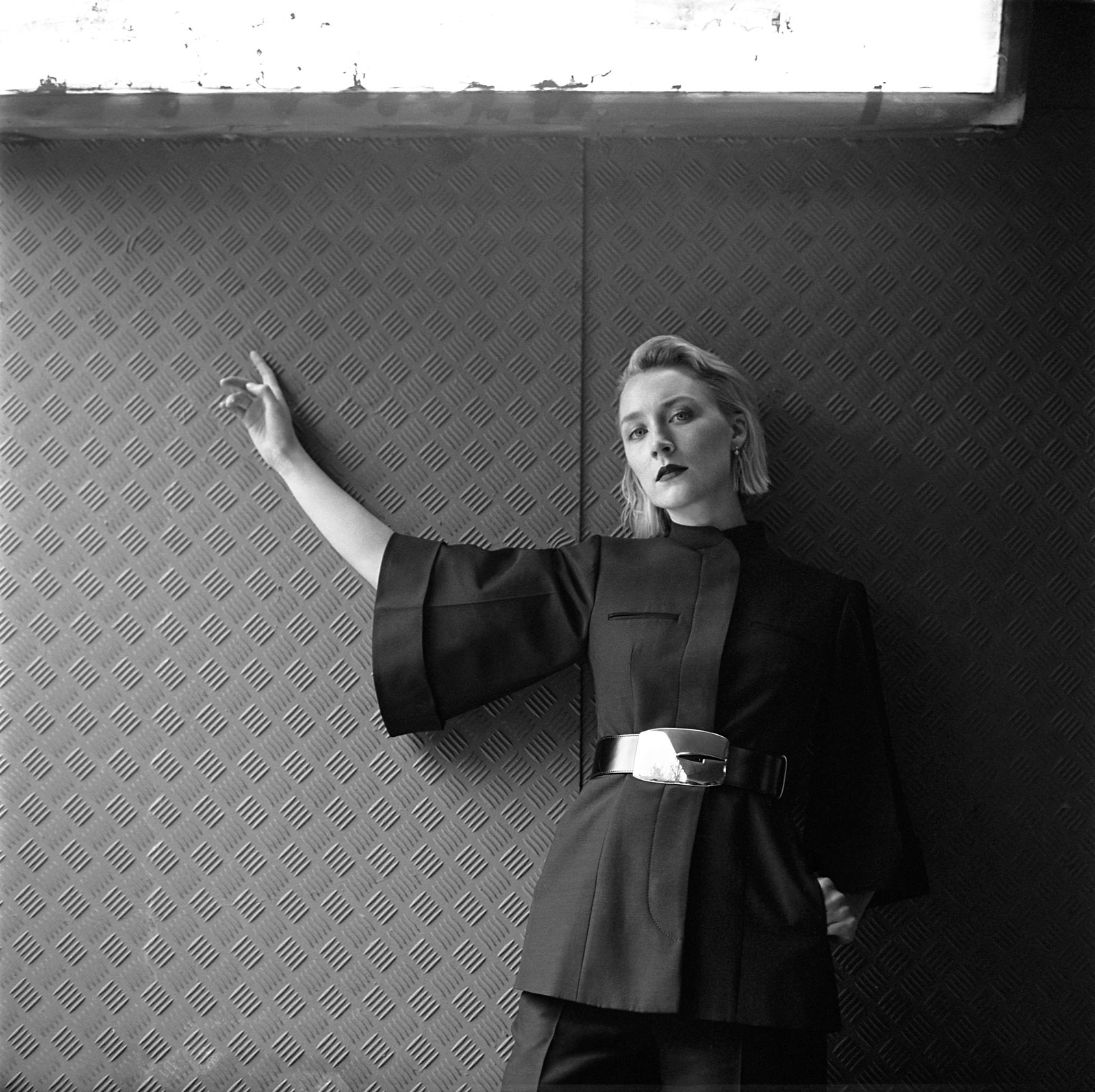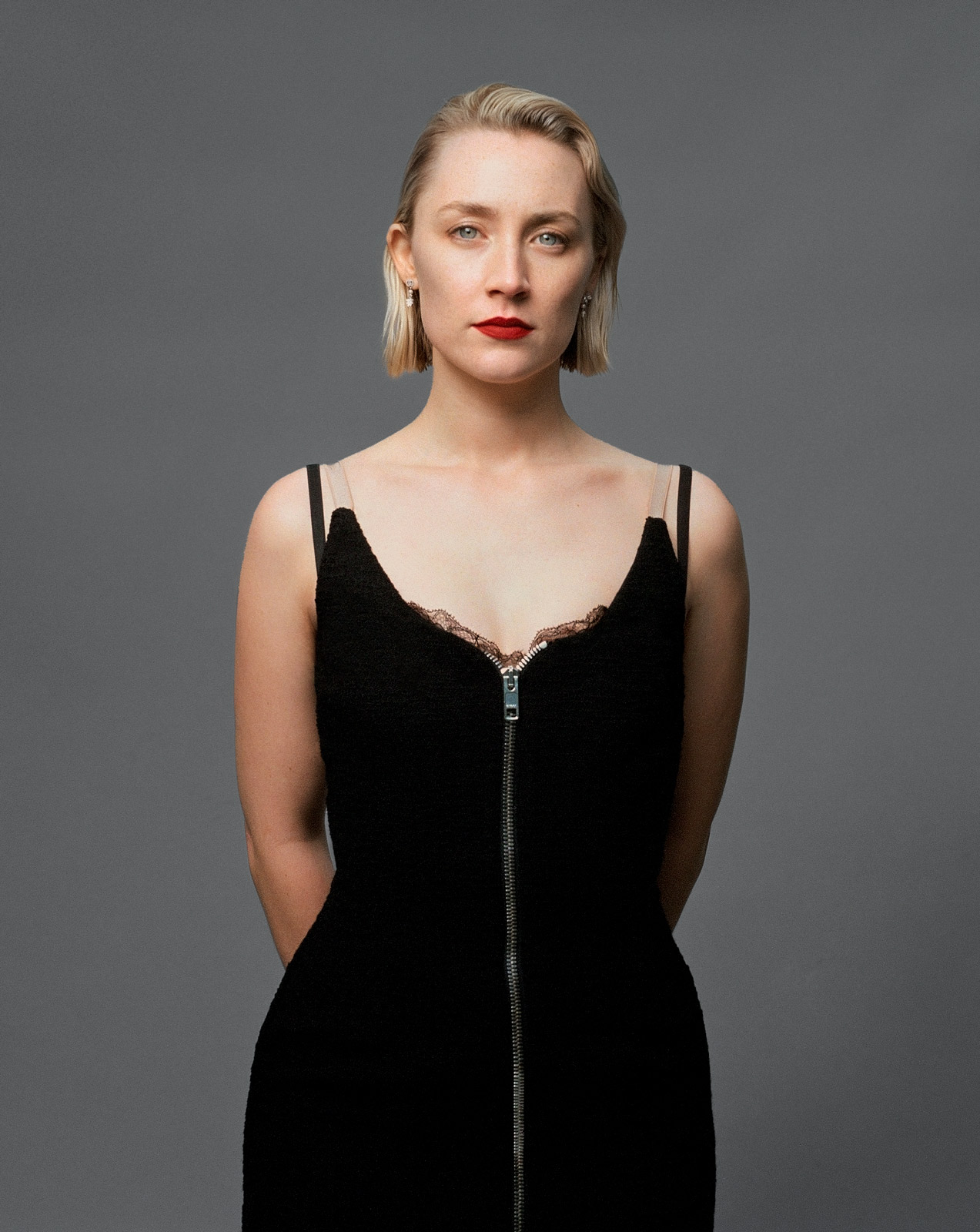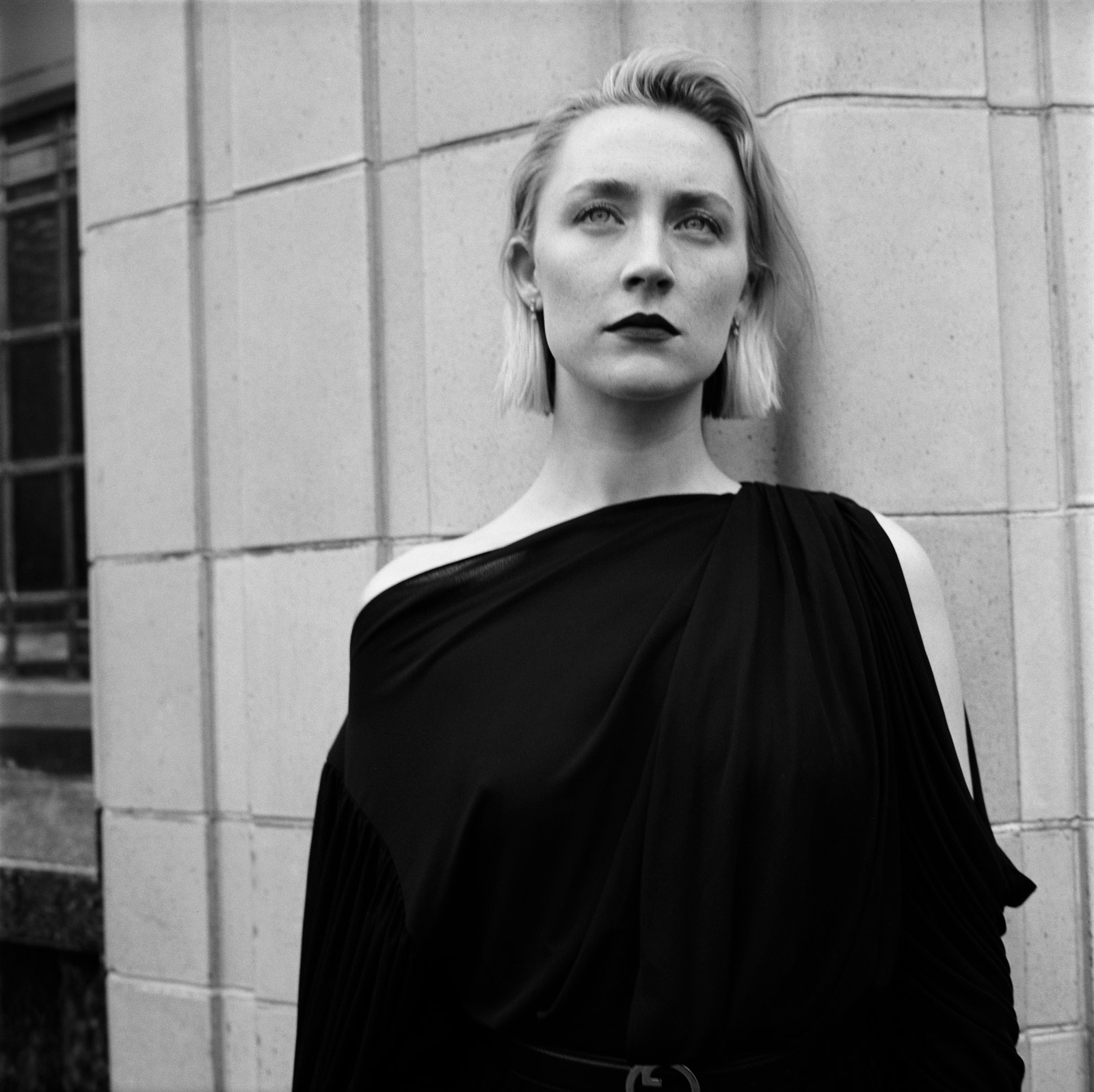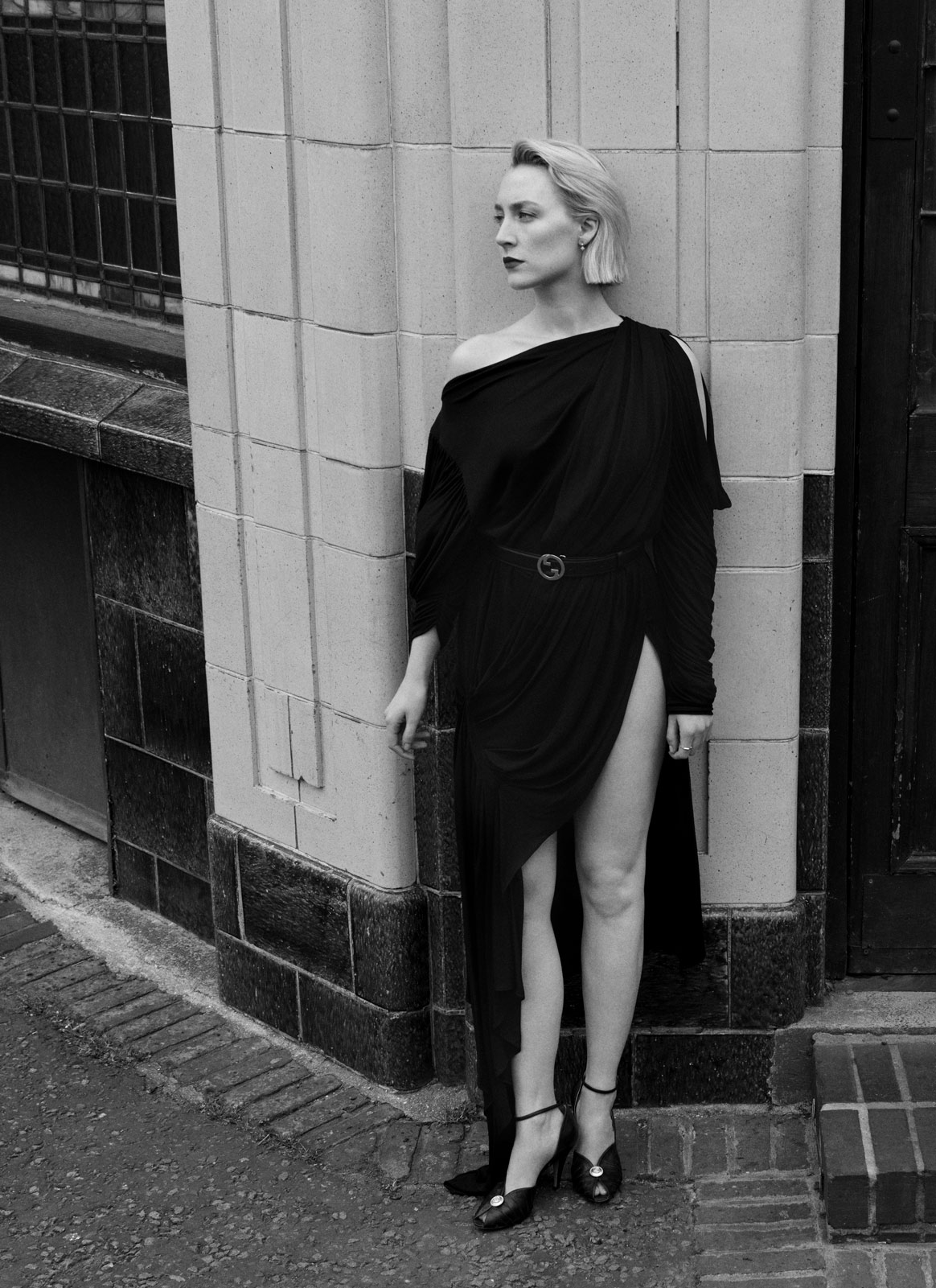
After their first meeting more than a decade ago, the actor and fashion editor come together, looking back on New York and life along the Irish Sea
Saoirse Ronan was 16 when she did her first Vogue photoshoot, under the creative direction of Grace Coddington. Then a rising star with the first of an eventual four Oscar nominations under her belt, the young actor used her considerable ability to fully embody Pre-Raphaelite muses, gazing at the heavens as an exquisitely doomed Ophelia, and running through overgrown castle gardens and untamed forests as a rogue Arthurian queen. The shoot is the perfect distillation of their shared capacity to convey an entire story in a single moment, with Ronan as its subject and Coddington as its mastermind. Photographed by Steven Meisel, the portraits beckon you into the fantastical world of a flaming-haired, barefooted woman, consumed in dramas of lore and legend—exactly the kind of mesmerizing, narratively rich images which characterize Coddington’s decades-long reign as American Vogue’s creative director. In the foreword Ronan later wrote for Grace: The American Vogue Years (Phaidon), she expressed a sentiment common among those who have been lucky enough to work with the fashion editor: “A fire as bright as her hair is brought to everything she makes room for in her heart. A burst of character and brilliance!”
Ronan initially caught Coddington’s attention in Atonement (2007) with her layered, piercing portrayal of Briony—the determined aspiring novelist and daughter of a wealthy English family on the eve of World War II, whose desire for control and all-consuming imagination wields tragic results. In the years since the editorial, the actor has repeatedly proven herself as a generational talent. Through her craft, she honors the nuance and depth of each role, whether she’s playing a liberal arts-aspiring high school senior in Sacramento in Lady Bird (2017), a young Irishwoman in the 1950s, torn between two homelands and, consequently, two futures in Brooklyn (2015); or the mother of all Complex Female Characters, Lady Macbeth herself, in her 2021 West End debut. The fire Ronan recognized in Coddington is one she herself possesses—an intensity of spirit demonstrated in her singular portrayal of Jo March in Little Women (2019). Her powerful, earnest delivery of the monologue that begins, “Women, they have minds, and they have souls, as well as just hearts,” is bound to go down as one of cinema’s most rousing feminist performances. Now in the next phase of superstardom, Ronan is slated to appear in three upcoming films, including Steve McQueen’s World War II historical drama Blitz; a film adaptation of Amy Liptrot’s celebrated memoir The Outrun, which sets themes of addiction and healing against the sheer cliffs and lush farmland of the remote Scottish coast; and Foe, a sci-fi thriller which sees Ronan alongside her friend and fellow countryman Paul Mescal, as they struggle to survive in a not-too-distant future world, ravaged by the impacts of climate change.
Ronan was born in the Bronx, New York, but spent the majority of her childhood in Ardattin, a tiny village just across the Irish Sea from Anglesey, the Welsh Island where Coddington grew up. United by an independence fostered by their idyllic rural upbringings, love of comedy, and aptitude for storytelling, the two reconnected on Saint Patrick’s Day, 12 years after their initial meeting, to discuss the charms of Lady Gaga, the unexpected benefits of emotional devastation, and the power of a signature hairstyle.
Grace Coddington: You cut your hair again.
Saoirse Ronan: Yeah, although I’m thinking about maybe going red soon. I’m sick of being blond. I honestly might go your color, because I haven’t done that in years.
Grace: We could be twins. I cut my hair, too.
Saoirse: I don’t think I’ve ever seen your hair that short. It looks amazing.
Grace: No, you haven’t, not since before you were born. I did have it very, very short a while back, 50 years ago.
Saoirse: Recently enough.
Grace: Are you filming at the moment?
Saoirse: I’m filming Blitz. But I live here as well now.
Grace: You abandoned Dublin?
Saoirse: I abandoned Dublin a while ago. I left when I was about 19. Then I did the play The Crucible in New York a few years ago, and then went back to Ireland for a spell. I’ve been in London ever since. I’m starting to actually like it now—it’s taken a few years. It’s a grower, London.
Grace: Well, I’ve seen you out and about a lot now. There were a lot of Irish people at the Oscars and things.
Saoirse: I know. God forbid. [Laughs] I’m so happy that they did so well this year. I love Martin McDonagh’s stuff, especially because he’s a sort of Plastic Paddy, so he has a more interesting take on Irish culture and Irish life. And then Paul Mescal, who’s a good friend of mine.
Grace: I’m in love with him.
Saoirse: Who isn’t?
Grace: Have you worked with him?
Saoirse: We did a film together at the beginning of last year in Australia, called Foe. We knew each other sort of in passing before, just through friends. We’ve become very, very close since making the film. We’re genuine friends; we’re not Hollywood friends.
Grace: Okay, you’ll need to introduce me someday.
Saoirse: Absolutely.
“I think the life that I would have had in New York—I’m sure it would have been fine—but it’s nothing compared to growing up in the countryside in Ireland, and having space and quiet and fresh air and being around animals. That is where I identify with being home.”
Grace: You’ve done a lot of humorous things. You were fantastic on Saturday Night Live.
Saoirse: Oh, thank you.
Grace: That’s a tough one to do, actually. I watched it live once, because I had said to Seth [Meyers], ‘Oh, God, I’d love to be on that.’ He said, ‘No, you wouldn’t.’
Saoirse: It’s a real killer.
Grace: When they’re shifting all the furniture around, and the huge, great sets, and they’re still acting. To host it must be really, really difficult.
Saoirse: It is and it isn’t. Someone said something that really stuck with me, which is if you’re not a fan of the show, you shouldn’t do the show. It takes so much energy out of you for the week, because—you’re right—it’s relentless. Not even just that Saturday night, when you do the show twice. I needed two B-12 shots throughout the week because I was so exhausted. People are usually doing it during a press junket, as well.
Grace: You totally looked like you were having the best time.
Saoirse: I absolutely loved it. I’ve always loved comedy. Actually, apart from the first film I made when I was like 11, I didn’t really get to do a lot of comedy. I was doing a lot of period dramas, or stuff that was quite serious.
But doing Lady Bird, and the things I’ve done recently that are a bit sillier—it’s come along at the right time.
Grace: I love the song you sang on Saturday Night Live.
Saoirse: I love that song, too, and it seems to have helped whoever had trouble with my name learn how to pronounce it. Since I started working, kind of to my shame, I had to anglicize my name a little bit. My name should be pronounced Seer-sha. But people couldn’t wrap their heads around that when I left Ireland, so I sort of anglicized it weirdly, over time. I think a lot of people in Ireland probably heard that song and were like, That’s not actually how you pronounce your name.
It’s so crazy, because you and I have known each other now for over 10 years. I think one of my very first photoshoots was with you for Vogue.
Grace: Oh, yeah? Your mother came, too. You had to have a guardian, or whatever it was. Steven [Meisel] was so funny. He said, ‘Hey, you can’t have her mother on-set.’ Your poor mother was, like, shooed away.
Saoirse: Dreadful.
Grace: And then you saw Lady Gaga.
Saoirse: That was a dream come true for me, because when I was younger, she was my idol. She was the person I admired most as a teenager. Genuinely. I remember always thinking, When I meet Lady Gaga—because I will meet her—I don’t want it to be at an industry thing. Because you never get to really properly spend time with anyone.
Grace: Oh, you never really get to say properly, ‘Nice to meet you.’
Saoirse: And they’re looking over your shoulder to see if there’s anyone more famous behind you. I just wanted to bump into her on the streets of somewhere. And that is exactly what happened.
Grace: Running across the grass in a super high boot that I couldn’t take one step in without falling.
Saoirse: And she had no trousers on. I couldn’t believe it. And she was so nice to my mom.
“Instantly, I loved the discipline of it. I loved having to work together. I loved that there were parameters set out ahead of time that you had to work within.”
Grace: Do you remember what it was like living in New York?
Saoirse: No. I have memories that aren’t specific to New York—like the first time I was really scared by something, which was with my mom and dad’s friend. He had one of those little wooden boxes, and when you’d open it there was a fake spider inside. You know those things? You open it and his legs wiggle. It really terrified me. I know that was in New York. I remember weird things, like the supermarket my mom used to take me to.
Grace: Why did your family move everybody back to Ireland?
Saoirse: Dad got discovered over there. Dad was a bartender, and he got discovered by an actor at the Irish Repertory Theatre. And he did really well onstage for a few years, and eventually moved into film.
Grace: Oh, so he’s an actor, too. Have I seen him in anything?
Saoirse: I don’t know if you would have seen him in anything. He was in a film years ago with Brad Pitt, called The Devil’s Own, which was about the Troubles in Ireland, of course.
Grace: Of course.
Saoirse: That’s why I’m so grateful for Martin McDonagh and Lenny Abrahamson, because they’re not making movies about the Troubles.
But work took my dad back to Ireland. And also, I think, from my mom’s point of view, having a kid—especially in New York, when you don’t have money, when you’ve got a husband who’s a struggling actor, and your family isn’t around—that’s hard.
I think the life that I would have had in New York—I’m sure it would have been fine—but it’s nothing compared to growing up in the countryside in Ireland, and having space and quiet and fresh air and being around animals. That is where I identify with being home.
Grace: Is that why you started acting, do you think? Because your dad was acting?
Saoirse: I was pretty young, and he was doing a short film back in Dublin, and they needed a kid. He was like, ‘Oh, I’ve got a kid right here, she could do it.’ I didn’t want to, because I actually wasn’t one of those kids that was very showy.
Grace: Thank God. Those acting kids are the worst.
Saoirse: I certainly wasn’t one of those kids. And he was like, ‘But you’ll get to get your face painted.’ And I was like, ‘I want to do it even less now.’ I hated all of that. Anyway, I guess his desperation persuaded me. I went on set for a day or two, and instantly, I loved the discipline of it. I loved having to work together. I loved that there were parameters set out ahead of time that you had to work within, especially on such a low-budget thing. I just really took to it, and then I started to audition. The first thing I went up for was a Michael Caine film. I didn’t get it, which was great, because I was devastated.
Grace: You didn’t get it?
Saoirse: My dad was like, ‘You’ll get it, you’ll get it,’ which is literally the worst thing to say to someone. And I didn’t get it. I was truly devastated. But it set me up for having a healthy amount of cynicism whenever I’ve had to audition. Eventually, I auditioned for this Michelle Pfeiffer film as this very worldly LA kid, which I just was not. I think someone else was cast; I don’t know why that didn’t work out, but [eventually] they called me up. Suddenly, I was in this film, playing Michelle Pfeiffer’s daughter, and Paul Rudd was in it, and Jon Lovitz, all these massive stars. Amy Heckerling, who directed it, didn’t tell anyone that I wasn’t American. I’d been doing an American accent and she only told them at the end—[when] there were agents in the room and stuff. She said, ‘By the way, that kid’s Irish.’ And then I got my American agents.
It was a few people along the way, just going like, ‘Look at this kid, who’s absolutely not right for your part at all. But just look at her anyway.’ And that’s what happened with Atonement. A dialect coach I worked with on the first movie, that Michelle Pfeiffer one, put me forward for Keira Knightley’s sister, which I was completely physically wrong for: I wasn’t English, certainly wasn’t upper-middle-class English. I think Joe [Wright] really fought for me to get the part, and that opened up a whole new world.
“My dad was like, ‘You’ll get it, you’ll get it,’ which is literally the worst thing to say to someone. And I didn’t get it. I was truly devastated. But it set me up for having a healthy amount of cynicism.”
Grace: I think Atonement was the first one I remember of you, and you were amazing. And then the next one was Hanna. I mean, I guess I’m a fashion person, so I was so stunned by your blond hair. It was visually so extraordinary.
Saoirse: I did [Hanna] when I was 15, and the hair and makeup designer said that she was going to bleach my eyebrows. At 15, when your face is still growing and nothing’s quite settled yet—that was traumatic. I was like, ‘You can’t take my eyebrows away from me, please!’
Grace: Well, you know, you can dye them back. At least they didn’t rip them out like they did to me back in 1958, when I started modeling. I remember going to Paris to meet this very famous agent, Eileen Ford. She said, ‘Hang on a minute, because we’ve got to fix your eyebrows.’ I had kind of strong eyebrows, like you. And they ripped them out.
Saoirse: Really?
Grace: I’ve had no eyebrows since. It was quite painful.
Saoirse: They ripped your eyebrows out and they never grew back? That’s mental.
Grace: No, I was told to keep them like that, so I kept taking them out. They got thinner and thinner, and now they won’t grow back.
Saoirse: I will say—even though that’s horrific that they did that—it’s added to your iconic look. You have such a gorgeous face anyway, it doesn’t matter. But that is awful. I spend a little amount of time in fashion and then I’m out again, but it does seem like a pretty brutal industry.
Grace: I know you were kind of reluctant when I offered you a job once—we won’t say what it was. You said, ‘I don’t like this, too sparkly.’
Saoirse: Yeah, well, you know—it’s so funny that you mentioned that. I’ve been working with Elizabeth Saltzman now for, I don’t know, eight or nine years. I remember my first meeting with her. The sort of memo she got beforehand from my publicist was: She doesn’t like anything pink and she doesn’t like anything sparkly and she doesn’t like anything girly. I think, probably, to my shame. When I was younger, I thought, That’s seen as a weakness, to wear things like that.
I turned up and all she had was pink, sparkles, girly, girly, girly. There were dropped necks and things that I would never have had the confidence to wear, because I don’t think I was comfortable yet with femininity and sexiness and all that sort of stuff. Today, I’m wearing sort of more demure stuff, but she completely changed my relationship with feminine clothing and owning that a bit more.
Grace: She used to work at Vogue, actually. A very long time ago, before she worked at Vanity Fair. She was always straightening her hair. I kept saying, ‘Let it go.’ I haven’t seen her in a while, so I don’t know what she looks like now—but she had this extraordinary… I mean, kind of like how my hair used to be, except it was dark. Your hair’s not curly, no?
Saoirse: No, my hair is nothing hair. It’s just dead weight. I need to get it layered and add color to it and things like that. Yours is nice though, because it’s got a lot of texture in it. It’s got a shape to it. Maybe my hair will look like yours [when I see you next].
Grace: Well, I don’t want to say it’ll look great, because that sounds a bit big-headed.
Saoirse: No, it’d be nice. We can be like twins. I’d love that.
Hair Soichi Inagaki at Art Partner. Make-up Petros Petrohilos at Streeters. Manicure Adam Slee at Streeters. Photo Assistant Greg Ponthus. Lighting Assistant Benjamin Coppola. Digital Technician Antoine Bernard. Stylist Assistant Malka Krijestorac. Tailor Laima Andraijauskaite. Hair Assistant Myuji Sato. Make-up Assistant Monique Gold. Production Farago Projects. Production Director Madeleine Kiersztan. Talent Director Tom Macklin.
Document Journal Spring/Summer 2023 Issue No. 22 is available for pre-order now. New covers will be unveiled over the coming days.


